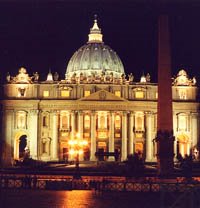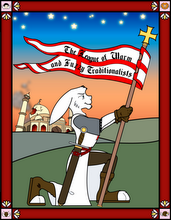
In the latest issue of Catholic World Report, there is an essay of interest regarding the last 40 years of liturgical music. Joseph P. Swain addresses how music(and actually the liturgy, for that matter) has taken up a democratic approach in both the writing and how it is brought into a parish. Since our Church is not run by a democracy, it is incompatible for any aspect of the faith to be moved through a democratic process or selection, this includes music. Just because the people in the pews in 1974 thought it was "cool" does not mean a form of music was correct or appropriate.
I have often read "polls" where they consider the plainchant/latin/gregorian chant to be ancient music, the Haugen/Hass/SL Jesuits to be "traditional"(cough, hack hack) and the rest contemporary(? I know, I was thinking the same thing) Here is one such poll conducted in a parish: News from the Liturgical War Front What makes a lay person an expert on sacred music, ever? Who is running our Church? Another example can be found here of polling: 'On Eagle's Wings' tops all songs in online liturgical music survey - For Discussion! I really don't care what Stacy from Arlington or Steve from Yonkers thinks should be played at a Mass, it's simply not a decision they should make or we should ask of their opinion. Until the Magisterium takes back the reigns, even to the chagrin of the people, we will never get out of this democratic music trap.
As a body, we no longer value our good musicians who have a respect for the sacred and the history of music in our parishes. I would venture to say in our diocese we may have 3-4 music/choir directors who know what they are doing and respect the liturgy. The majority are people pleasers. If music selection is run by the lay people and the lay people do not know their faith and feel they should "get something" from Mass, we will stay in this pit of hokey-hippydom for a long, long time. Students and professionals who classically train in organ and the classics should be employed by our parishes and be able to make a living serving the Church. The essay pointed out that if we as a parish needed a new roof or foundation, we would not put a notice in the bulletin looking for volunteers. We do that with music, and you get what you pay for.
If majority rules in a parish, it takes the democratization to another level and the priests and bishops will also pander to the masses. The hierarchy need to take back the job of calling the shots on liturgical music and be informed and educated on what constitutes sacred music as well. Just because it is pretty and easy to sing does not deem it appropriate for the supernatural sacredness of the Mass.
In closing, I have to add my favorite comment found at the end of the last linked article.
It's the latest "trend" in Christian music. I call them "Jesus is my boyfriend" songs. Instead of glorifying the Lord.........they are romantic love songs and they turn my stomach.
Uh, yeah. I wholeheartedly agree!















1 comment:
Exactly.
The sad thing is that I think most people would prefer plainchant and Palestrina, if only they were exposed to it.
I think most people would prefer a reverent liturgy that doesn't make them feel like Baptists, if only they were exposed to it.
I can't change the world, or even Illinois, but I just want people to know that thinking Haugen is good music or that Latin for old people or that liturgical dance is a good way to worship doesn't make them bad, or stupid, or less holy than me. It just means they're ill-informed, and I think exposing people to beauty and reverence can really change things. I think once people actually read the prayers from the old missal, it begins to make sense. I think once they understand the importance of tradition, culture, and obedience, it becomes not "It's right because the traddies say it is" but "It finally makes sense now! I figured it out!" (Just like I exclaimed a few years back.)
A few years back, there were just a handful of Tridentine Masses available. Today, there are many more, and vocations in those dioceses and parishes are growing by leaps and bounds, and orthodoxy is making its inevitable comeback.
Post a Comment